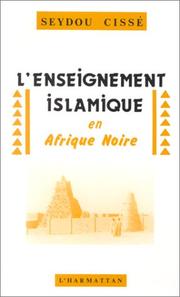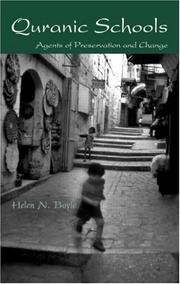| Listing 1 - 10 of 96 | << page >> |
Sort by
|
Periodical
ISSN: 27228223 28304659 Year: 2020 Publisher: Pati : Institute for Research and Community Service, Institut Pesantren Mathali'ul Falah Pati,
Abstract | Keywords | Export | Availability | Bookmark
 Loading...
Loading...Choose an application
- Reference Manager
- EndNote
- RefWorks (Direct export to RefWorks)

ISBN: 9782738411310 2738411312 Year: 1992 Publisher: Paris: L'Harmattan,
Abstract | Keywords | Export | Availability | Bookmark
 Loading...
Loading...Choose an application
- Reference Manager
- EndNote
- RefWorks (Direct export to RefWorks)
Book
Year: 2005 Publisher: [Washington, D.C. : World Bank,
Abstract | Keywords | Export | Availability | Bookmark
 Loading...
Loading...Choose an application
- Reference Manager
- EndNote
- RefWorks (Direct export to RefWorks)
"Bold assertions have been made in policy reports and popular articles on the high and increasing enrollment in Pakistani religious schools, commonly known as madrassas. Given the importance placed on the subject by policymakers in Pakistan and those internationally, it is troubling that none of the reports and articles reviewed based their analysis on publicly available data or established statistical methodologies. The authors of this paper use published data sources and a census of schooling choice to show that existing estimates are inflated by an order of magnitude. Madrassas account for less than 1 percent of all enrollment in the country and there is no evidence of a dramatic increase in recent years. The educational landscape in Pakistan has changed substantially in the past decade, but this is due to an explosion of private schools, an important fact that has been left out of the debate on Pakistani education. Moreover, when the authors look at school choice, they find that no one explanation fits the data. While most existing theories of madrassa enrollment are based on household attributes (for instance, a preference for religious schooling or the household's access to other schooling options), the data show that among households with at least one child enrolled in a madrassa, 75 percent send their second (and/or third) child to a public or private school or both. Widely promoted theories simply do not explain this substantial variation within households. This paper--a product of the Public Services Team, Development Research Group--is part of a larger effort in the group to examine issues relating to educational outcomes"--World Bank web site.
Book
ISBN: 9290636777 Year: 1985 Publisher: Istanbul Centre de recherches sur l'histoire, l'art et la culture islamiques
Abstract | Keywords | Export | Availability | Bookmark
 Loading...
Loading...Choose an application
- Reference Manager
- EndNote
- RefWorks (Direct export to RefWorks)
Book
Year: 2005 Publisher: [Washington, D.C. : World Bank,
Abstract | Keywords | Export | Availability | Bookmark
 Loading...
Loading...Choose an application
- Reference Manager
- EndNote
- RefWorks (Direct export to RefWorks)
"Bold assertions have been made in policy reports and popular articles on the high and increasing enrollment in Pakistani religious schools, commonly known as madrassas. Given the importance placed on the subject by policymakers in Pakistan and those internationally, it is troubling that none of the reports and articles reviewed based their analysis on publicly available data or established statistical methodologies. The authors of this paper use published data sources and a census of schooling choice to show that existing estimates are inflated by an order of magnitude. Madrassas account for less than 1 percent of all enrollment in the country and there is no evidence of a dramatic increase in recent years. The educational landscape in Pakistan has changed substantially in the past decade, but this is due to an explosion of private schools, an important fact that has been left out of the debate on Pakistani education. Moreover, when the authors look at school choice, they find that no one explanation fits the data. While most existing theories of madrassa enrollment are based on household attributes (for instance, a preference for religious schooling or the household's access to other schooling options), the data show that among households with at least one child enrolled in a madrassa, 75 percent send their second (and/or third) child to a public or private school or both. Widely promoted theories simply do not explain this substantial variation within households. This paper--a product of the Public Services Team, Development Research Group--is part of a larger effort in the group to examine issues relating to educational outcomes"--World Bank web site.
Book
ISBN: 3657780912 Year: 2015 Publisher: Paderborn : Verlag Ferdinand Schöningh,
Abstract | Keywords | Export | Availability | Bookmark
 Loading...
Loading...Choose an application
- Reference Manager
- EndNote
- RefWorks (Direct export to RefWorks)
Der Gesandte Muhammad gilt für Muslime als nachzuahmendes Ideal. Auch im Islamischen Religionsunterricht soll und wird er eine zentrale Rolle spielen. Es bedarf einer theologischen Reflexion, um Überhöhungstendenzen in traditionsgespeisten Prophetendarstellungen entgegenzuwirken. Als erste an den methodischen Standards moderner westlicher Religionspädagogik ausgerichtete, islamisch-theologische Arbeit zeigt dieser Band unterschiedliche Diskurse traditioneller Apologetik islamischer Prophetie auf. In Hinblick auf den Islamischen Religionsunterricht würdigt er vor allem Muhammad in seiner regulativen Funktion und präsentiert ihn als geerdete Prophetengestalt.
Book
ISBN: 1472569385 9781472569387 Year: 2015 Publisher: London: Bloomsbury academic,
Abstract | Keywords | Export | Availability | Bookmark
 Loading...
Loading...Choose an application
- Reference Manager
- EndNote
- RefWorks (Direct export to RefWorks)
"The Western world often fears many aspects of Islam, without the knowledge to move forward. On the other hand, there are sustained and complex debates within Islam about how to live in the modern world with faith. Alison Scott-Baumann and Sariya Contractor-Cheruvallil here propose solutions to both dilemmas, with a particular emphasis on the role of women.Challenging existing beliefs about Islam in Britain, this book offers a paradigm shift based on research conducted over 15 years. The educational needs within several groups of British Muslims were explored, resulting in the need to offer critical analysis of the provision for the study of classical Islamic Theology in Britain. Islamic Education in Britain responds to the dissatisfaction among many young Muslim men and women with the theological/secular split, and their desire for courses that provide combinations of these two strands of their lived experience as Muslim British citizens. Grounded in empirical research, the authors reach beyond the meta-narratives of secularization and orientalism to demonstrate the importance of the teaching and learning of classical Islamic studies for the promotion of reasoned dialogue, interfaith and intercultural understanding in pluralist British society"--
Book
ISBN: 9789954212349 9954212345 Year: 2011 Publisher: Rabat: Marsam,
Abstract | Keywords | Export | Availability | Bookmark
 Loading...
Loading...Choose an application
- Reference Manager
- EndNote
- RefWorks (Direct export to RefWorks)
Islamic religious education --- Islamic education --- Education --- Islam
Book
ISBN: 9788173048562 Year: 2010 Publisher: New Delhi : Manohar Publishers & Distributors,
Abstract | Keywords | Export | Availability | Bookmark
 Loading...
Loading...Choose an application
- Reference Manager
- EndNote
- RefWorks (Direct export to RefWorks)
Islamic education --- Islamic religious education --- Muslims --- Education

ISBN: 0415946352 Year: 2004 Publisher: New York (N.Y.) RoutledgeFalmer.
Abstract | Keywords | Export | Availability | Bookmark
 Loading...
Loading...Choose an application
- Reference Manager
- EndNote
- RefWorks (Direct export to RefWorks)
Islamic religious education --- Qurʼan --- Study and teaching.
| Listing 1 - 10 of 96 | << page >> |
Sort by
|

 Search
Search Feedback
Feedback About UniCat
About UniCat  Help
Help News
News